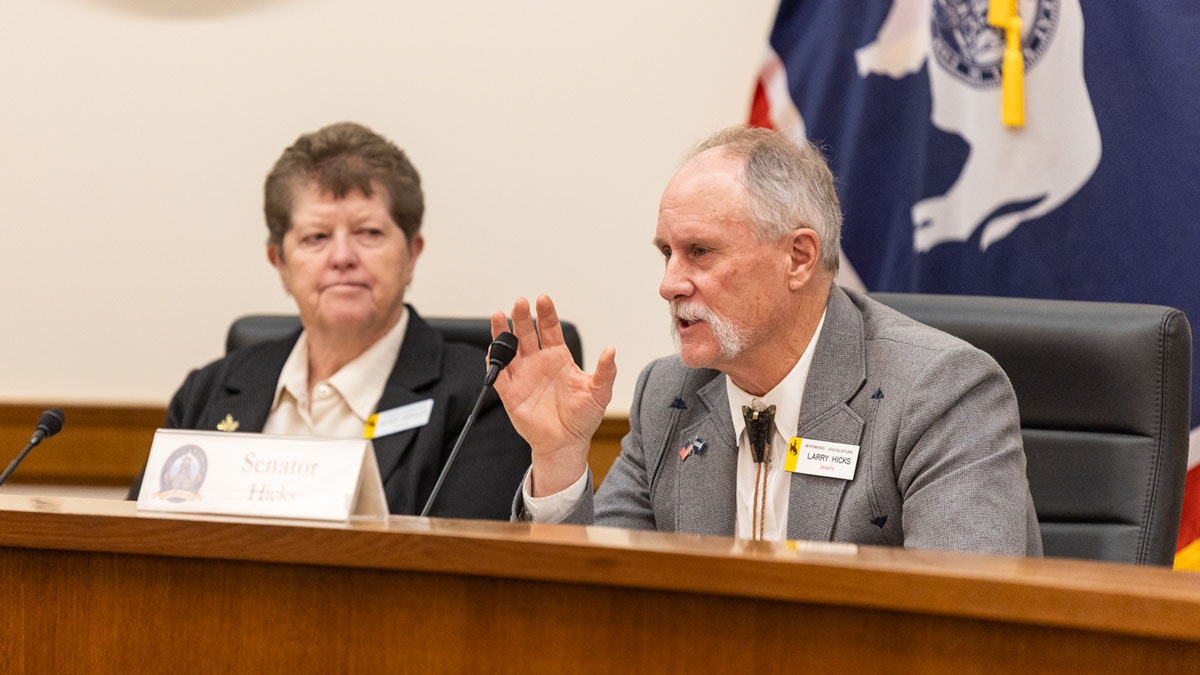A push to eliminate electronic ballot counting machines in favor of hand counts in Wyoming’s elections is spreading across the state, and it has the full support of Secretary of State Chuck Gray.
Wyoming Voter Initiatives, the same group that recently turned in 44,000 signatures to get a property tax initiative on the 2026 ballot, is now working on a new effort to have all ballots hand counted.
The goal is to get the initiative on the 2026 ballots and implemented for the 2028 elections.
In addition to the “People’s Initiative to Restore Hand Tabulation of all Elections in Wyoming” ballot initiative, the group also wants to overhaul the state’s Title 22 election code through the Legislature by enacting measures allowing for public ballot inspections, stricter voter ID and registration requirements, and ban ballot dropboxes.
Organizer and Cody resident Brent Bien said he worries people won’t vote if they don’t have confidence in Wyoming’s elections.
“Having those trustworthy, transparent elections to where the people feel confident again,” Bien said of the group’s goal. “It’s one thing for every vote to count, it’s another thing entirely for every vote to count for the intended recipient.”
Rich Weber, another member of the group from Sheridan, said Attorney General Bridget Hill has misinterpreted the Wyoming Constitution to mean that members of the public can’t inspect any ballots.
The group wants to change that.
Gray’s Effort
In a separate effort, Gray recently requested the Legislative Service Office draft a bill for the upcoming state Corporations, Elections and Political Subdivisions Committee meeting later this month that would implement hand count auditing of election ballots, an effort he said he's also been on working with individual legislators.
“I have made clear to all of the county clerks that I believe that we need to move toward a hand audit of the election,” Gray said.
State Sen. Cale Case, R-Lander, chairman of the Senate Corporations Committee, opposes the hand count effort.
He compared the idea to banks, which don’t hand count their coins.
“This is a great system,” he said about the available technology to count ballots. “We need the automation to make it work. Machine count is so much better.”
Gray also told Cowboy State Daily he’ll soon announce an internal working group that will include “citizens" to study hand audits of elections “so that we can make clear in Wyoming state law that hand audits are required, because clerks are refusing to work with us to advocate for hand audits.”
Similarly, Gray supports the initiative to hand count all ballots.
“I think it’s wonderful that there is a group of citizens looking at taking similar action with the initiative process,” he said.
Why Hand Count?
In 1957, the Wyoming Legislature first permitted the use of automated voting machines in the Cowboy State, according to the State Archives.
Prior to that, elections in Wyoming and most places around the world counted ballots by hand.
Punch card voting developed in the 1960s, allowing voters to punch holes in cards to select candidates with a “ballot marking device.”
Around 2004, Wyoming started transitioning to digital voting machines.
In 2020, the state signed a $5.4 million contract with ES&S to provide the entire state with voting machines. No other machines are used in Wyoming.
The push for a hand-counted election follows directly in line with former President Donald Trump’s claims that the 2020 presidential election was rigged. Trump’s claims popularized a previously fringe belief that voting machines are tampered with and hacked into during American elections.
This belief has continued on for some long past that election and into the current election cycle.
Initiative member and Wheatland resident Jill Kaufman mentioned how ES&S machines can connect to the internet when being serviced by a technician with the company. She also finds it concerning that none of the machines have received antivirus updates since May 2022, a service that can only be performed by an ES&S staffer.
“Our focus is to bring back the vote so that we the people can have control of our own vote (and) we’re not being told by somebody out of our state and not having a software update coming from a different state to update our machines,” she said. “The people are waking up and saying, ‘Let’s bring it back to our counties.’”
National Movement
Various counties throughout the country have reverted to hand count elections. The push for hand count in Wyoming first started picking up momentum around early 2022 in Park County
In 2023, at least eight states introduced legislation banning the use of vote counting machines, according to VerfiedVoting.org. One proposal in Arizona would have effectively banned vote counting machines by requiring equipment be configured in ways that do not currently exist.
For Bien, who agrees with this, said it’s a matter of voter confidence in elections. He believes election security is the biggest issue for Republicans.
“If the folks don’t trust the system, if the folks don’t trust the voting process, then it’s the government’s obligation and duty to change that,” Bien said. “Right now, people don’t trust the system.”
Wyoming Perspective
Late last month, South Dakota computer consultant Rick Weible gave a demonstration in Wheatland, where he claimed to have found around 1,800 vulnerabilities in Wyoming’s ES&S voting machines.
“Technology is not stopping, and what’s unfortunate or fortunate is that our communities don’t understand the thorough vulnerabilities of our technology,” Kaufman said. “What we see in the public is not nearly what our technology is.”
Malcolm Ervin, Platte County clerk and president of the Wyoming County Clerks Association, attended the presentation. He said he talked to some attendees who said they gained more confidence in the electronic voting equipment, not less, after attending.
Ervin said the event was enlightening and productive. He found it notable that Weible did not advocate against the use of electronic voting machines in elections, but like Gray also supports the push for a hand count audit, which Ervin finds a “natural first step” on the way toward hand count elections.
“After doing that (audit), people will realize that election equipment is accurate, is more efficient,” Ervin said. “Oddly, a hand audit may grow people’s confidence in elections, which is what we want.”
But Ervin disagrees with the underlying drive for hand count elections and believes they will make elections less secure, efficient and accurate.
Despite the opposition of county clerks, he believes they share the same universal goals for Wyoming elections as the hand counters.
“We do believe the equipment is more accurate, more secure, more efficient,” he said. “Exclusively hand counting, and just disregarding the equipment, would be taking a step back.”
Unlike organizers of the initiative, Ervin does not believe most Wyoming residents support hand count elections, which Ervin said were rampant with accusations of fraud when employed for hundreds of years prior to the 20th century.
“People that think hand counting will suddenly cure (perceptions of fraud). I don’t think that will be the reality,” Ervin said.
What’s Better?
The reliability of hand count elections depends on who you talk to.
Supporters argue that election machines can’t be trusted and could be easily hacked, although there is little to no hard evidence of that happening.
Kaufman said she trusts people in her county more than ES&S employees who program the voting machines.
“I trust people in my county more than I trust somebody in another state with whatever’s going on for their agenda,” Kaufman said.
Opponents say that leaving the counting of election ballots up to humans will invite more fraud, not less.
A 2007 Rice University study of hand count elections found that only 57.5% of participants’ counts provided the correct results.
Hand count detractors have also criticized how long it would take to get election results if the ballots were counted by hand. Case mentioned how in today’s age of digital information, many people may get frustrated if preliminary results aren’t returned by election night.
To receive the results in a timely manner, a significant pool of ballot counters would need to be recruited throughout the state.
VerifiedVoting reports that in Shasta County, California, home to more than 112,000 registered voters, the county clerk and registrar of voters there released estimates for the implementation of hand counting all ballots. It would take about 1,200 additional workers to meet the mandated 30-day post-election certification deadline, and at least $1.6 million to cover labor costs.
Where To Find The Counters
For reasons like these the Equality State Policy Center opposes hand-counted elections.
“The ESPC is firmly against the exorbitant amount of Wyoming tax dollars and time from our government workers that a hand count would cost our local governments,” said Marissa Carpio, a representative with the organization. “We trust the ballot tabulating machines, which are confirmed secure with rigorous testing and audit processes by our competent county clerks.”
In Wyoming, the costs wouldn’t likely be nearly as steep as the California example, but Ervin said the hand counting would still have to be done by election judges, members of the public who are paid for their volunteer election work but can decline to accept payment.
Particularly challenging in some deep red counties in Wyoming would be the task of finding an equal number of Republican, Democratic and Independent judges, which is required under law.
Weber said a small number of counters would be a benefit, however, because it would be difficult for individual counters to commit a large amount of fraud.
Laws Would Need Changing
For either a hand count election or audit, Ervin said Wyoming’s laws would also need to be changed to allow more time for the certification of election results.
All elections now must be certified by the end of day Friday after a Tuesday election. An audit of the ballot images must be completed by the day before, Thursday, which Ervin said is critical as a county would not want to certify its election results before that’s completed.
Weber mentioned how France processes its 45 million election ballots by hand in presidential elections, with the results returning the night of voting. France’s elections are a bit different, however, as residents there only vote on a single race for president, there is no Electoral College, and there is no mail-in voting.
The Wyoming hand count initiative is still being worked on and has not been submitted for certification to start collecting signatures.
Leo Wolfson can be reached at leo@cowboystatedaily.com.





